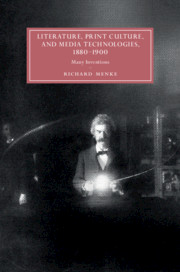Book contents
- Literature, Print Culture, and Media Technologies, 1880–1900
- Cambridge Studies in Nineteenth-Century Literature and Culture
- Literature, Print Culture, and Media Technologies, 1880–1900
- Copyright page
- Contents
- Figures
- Acknowledgments
- Introduction
- Chapter 1 A Message on All Channels
- Chapter 2 Fictions of the Victorian Telephone
- Chapter 3 New Media, New Journalism, New Grub Street
- Chapter 4 The Sinking of the Triple-Decker
- Chapter 5 Writers of Books
- Chapter 6 Words Fail
- Chapter 7 A Connecticut Yankee’s Media Wars
- After Words
- Bibliography
- Notes
- Index
- Cambridge Studies in Nineteenth-Century Literature and Culture
Chapter 5 - Writers of Books
The Unmediated Novel
Published online by Cambridge University Press: 30 September 2019
- Literature, Print Culture, and Media Technologies, 1880–1900
- Cambridge Studies in Nineteenth-Century Literature and Culture
- Literature, Print Culture, and Media Technologies, 1880–1900
- Copyright page
- Contents
- Figures
- Acknowledgments
- Introduction
- Chapter 1 A Message on All Channels
- Chapter 2 Fictions of the Victorian Telephone
- Chapter 3 New Media, New Journalism, New Grub Street
- Chapter 4 The Sinking of the Triple-Decker
- Chapter 5 Writers of Books
- Chapter 6 Words Fail
- Chapter 7 A Connecticut Yankee’s Media Wars
- After Words
- Bibliography
- Notes
- Index
- Cambridge Studies in Nineteenth-Century Literature and Culture
Summary
Marie Corelli wrote bestselling supernatural romances and detested the New Woman, while George Paston wrote realistic New Woman novels that cultivated a small, intellectual readership. Yet in the wake of the three-volume novel, both authors produced fiction about the writing life that makes the case for the codex book and the single-volume novel as bulwarks against the circular, self-contained system of other media—a system maintained by men. Corelli’s The Sorrows of Satan (1895) puts forward the bestselling novel as a means of direct, sanctified connection between celebrity author and adoring audience. Paston’s A Writer of Books (1898) looks to the future work, the novel unwritten, as a repository of truth and meaning. Together, they suggest that in the wake of the three-volume novel, the problem of the novel’s relationship to media systems could be approached as a problem of how and whether the novel mediates.
Keywords
- Type
- Chapter
- Information
- Literature, Print Culture, and Media Technologies, 1880–1900Many Inventions, pp. 112 - 136Publisher: Cambridge University PressPrint publication year: 2019

